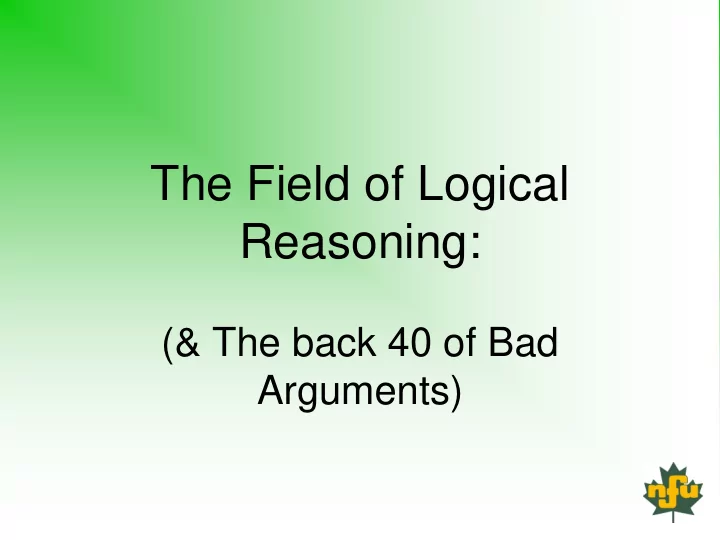

The Field of Logical Reasoning: (& The back 40 of Bad Arguments)
Adapted from: An Illustrated Book of Bad Arguments: Learn the lost art of making sense by Ali Almossawi *Not, by any stretch of the imagination, the only source on this topic…
Disclaimer This is not the only (or even best) approach to thinking, examining, analyzing creating policy, positions or arguments. “ Logic no more explains how we think than grammar explains how we speak.” M. Minsky
Other Ways… • Logical Reasoning comes from Age-Old disciplines/practices of REASON. • But REASON is only ONE human characteristic • Other methods/processes are drawn from the strengths of other characteristics
Other Human Characteristics: • John Ralston Saul (Unconscious Civilization, 1995) lists SIX Human Characteristics • They are (alphabetically, so as not to create a hierarchy): • Common Sense • Intuition • Creativity • Memory • Ethics • Reason
Reason is not Superior • While this presentation focuses on the practices of REASON, it is necessary to actively engage our collective notions rooted in: • Common Sense (everyday understandings) • Creativity (new, novel approaches) • Ethics (relative moral high-ground) • Intuition (gut instinct) • Memory (history, stories) …in order to have a holistic/inclusive approach to reasonable doubt and public participation.
However: • Given the west’s weakness for Reason and the relative dominance of Reason in public policy, we need to equip ourselves and understand its use and misuse. • Enter: The Field of Logical Reasoning vs. Logical Fallacy
Appeal to Hypocrisy Defending an error in one's reasoning by pointing out that one's opponent has made the same error.
What’s a Logical Fallacy? • ALL logical fallacies are a form of Non- Sequitur • Non sequitur, in formal logic, is an argument in which its conclusion does not follow from its premises. Wikipedia • In a non sequitur , the conclusion could be either true or false, but the argument is fallacious because there is a disconnection between the premise and the conclusion.
Formal Propositional Affirming the Consequent Logical Fallacies Equivocation Ambiguity > redefinition No True Scotsman Not a cause for a cause Causal Slippery Slope False Dilemma Unwarranted Assumption Composition and Division Begging the Question Circular Reasoning Informal Un-representative Sample Hasty Generalization Missing Data Appeal to Ignorance Family Appeal to the Bandwagon Tree of Emotional Appeal Appeal to Fear Logical Appeal to Ad Hominem Hypocrisy Red Herrings Genetic Fallacy Fallacies Appeal to Irrelevant Authority Straw Man Guilt By Association Argument From Consequences
Today’s Workshop: After a brief overview of some logical fallacies, we will ask you all to ponder on a logical fallacy you have heard used, recently, and highlight it for us all.
The Ten Commandments of Logic: Thou shalt not assume “this” follows “that” when there is no logical connection. 1) ( Non sequitur ) 2) Thou shalt not lay the burden of proof onto him that is questioning the claim. ( Burden of proof ) Thou shalt not attack the person’s character, but the argument. ( Ad hominem ) 3) Thou shalt not misrepresent or exaggerate a person’s argument in order to 4) make it easier to attack. ( Straw man fallacy ) 5) Thou shalt not use small numbers to represent the all. ( Hasty generalization ) 6) Thou shalt not argue thy position by assuming one of its premises is true. ( Begging the question ) 7) Thou shalt not claim that because something occurred before, it must be the cause. ( Post hoc/False cause ) 8) Thou shalt not reduce the argument down to two possibilities. ( False dichotomy ) 9) Thou shalt not argue that because of our ignorance, a claim must be true or false. ( Ad ignorantum ) 10) Thou shalt not argue that because a premise is popular, therefore it must be true. ( Bandwagon fallacy )
Formal • Affirming the Consequent 2 = a number 1 = a number 2 = 1
Affirming the Consequent
Informal • Ambiguity -No True Scotsman -Equivocation • Causal -Slippery Slope -Not a Cause for a Cause • Unwarranted Assumption -False Dilemma -Composition and Division • Begging the Question -Circular Reasoning • Unrepresentative Sample/Weak Analogy -Hasty Generalization • Missing Data -Appeal to Ignorance
No True Scotsman
Equivocation Thou shalt not change the meaning of a word mid argument.
Slippery Slope Thou shalt not predict doomsday just because you don't like the idea.
Not a Cause for a Cause Thou shalt not claim that because something occurred before, it must be the cause.
False Dilemma/Dichotomy Thou shalt not reduce the argument down to two possibilities.
Composition and Division
Circular Reasoning (Begging the Question) Thou shalt not argue thy position by assuming one of its premises is true.
Hasty Generalization Thou shalt not use small numbers to represent the all.
Appeal to Ignorance Thou shalt not argue that because of our ignorance, a claim must be true or false.
Informal: Red Herrings • Appeal to Bandwagon • (Emotional) Appeal to Fear • Argument from Consequences • Guilt by Association • Straw Man • Genetic Fallacy; Appeal to Irrelevant Authority • Ad Hominum; Appeal to Hypocrisy
Appeal to the Bandwagon Thou shalt not argue that because a premise is popular, therefore it must be true.
Appeal to Fear
Argument from the Consequence
Straw Man Thou shalt not misrepresent or exaggerate a person’s argument in order to make it easier to attack.
Guilt by Association
Genetic Fallacy
Appeal to Irrelevant Authority
Ad Hominem Thou shalt not attack the person’s character, but the argument.
Formal Propositional Affirming the Consequent Logical Fallacies Equivocation Ambiguity > redefinition No True Scotsman Not a cause for a cause Causal Slippery Slope False Dilemma Unwarranted Assumption Composition and Division Begging the Question Circular Reasoning Informal Un-representative Sample Hasty Generalization Missing Data Appeal to Ignorance Family Appeal to the Bandwagon Tree of Emotional Appeal Appeal to Fear Logical Appeal to Ad Hominem Hypocrisy Red Herrings Genetic Fallacy Fallacies Appeal to Irrelevant Authority Straw Man Guilt By Association Argument From Consequences
Recommend
More recommend